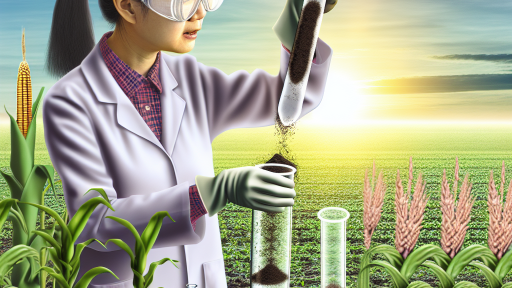Introduction to Smart Contracts and Blockchain in Agriculture
Understanding Smart Contracts
Smart contracts are self-executing contracts with the terms written into code.
They automatically enforce and execute agreed terms without intermediaries.
In agriculture, smart contracts streamline transactions between farmers and suppliers.
This technology reduces the risk of disputes and delays.
Additionally, it enhances transparency in agricultural agreements.
The Role of Blockchain Technology
Blockchain serves as a secure and transparent ledger for transactions.
It records all entries and changes in a decentralized manner.
This ensures that all parties have access to the same information.
Furthermore, it prevents tampering with records in agriculture.
Farmers can trace the origin of goods through blockchain’s immutable records.
Benefits of Implementing Smart Contracts and Blockchain
Integrating smart contracts and blockchain offers numerous advantages.
- Increased efficiency reduces the time needed for transaction processing.
- Cost savings arise from decreased reliance on intermediaries.
- Transparency builds trust between farmers and buyers.
- Security enhances protection against fraud and unauthorized changes.
Real-world Applications in Agriculture
Many agricultural sectors are adopting these technologies.
For instance, some farmers use smart contracts for crop insurance.
Others apply blockchain to validate organic certification effectively.
This trail of verification improves market access for smallholder farmers.
Transform Your Agribusiness
Unlock your farm's potential with expert advice tailored to your needs. Get actionable steps that drive real results.
Get StartedChallenges and Considerations
Despite the benefits, challenges remain in implementing these technologies.
High initial costs can deter some farmers from adopting new systems.
Additionally, a lack of technical knowledge may hinder adoption.
Furthermore, issues related to data privacy need addressing.
Farmers must understand the implications of sharing their data on blockchain.
How Blockchain Technology Enhances Transparency in Farming Agreements
Understanding Blockchain Basics
Blockchain technology serves as a decentralized digital ledger.
This system securely records transactions across multiple computers.
Consequently, it prevents alterations or fraudulent activities.
Farmers and suppliers benefit significantly from this innovation.
Providing Immutable Records
Blockchain creates immutable records for all transactions.
This means that once a transaction is recorded, it cannot be changed.
Thus, every agreement made is permanently visible to all parties.
This transparency builds trust among farmers and stakeholders.
Reducing Disputes and Misunderstandings
Farming agreements often involve various terms and conditions.
With blockchain, all parties access the same information easily.
This access minimizes the chances of disputes regarding agreements.
As a result, relationships among farmers, suppliers, and buyers strengthen.
Streamlining Processes and Reducing Costs
Blockchain technology can streamline the process of farming agreements.
It reduces the need for intermediaries, saving time and effort.
Typically, this can also decrease overall transaction costs.
Therefore, farmers can allocate resources more effectively.
Enhancing Traceability and Accountability
Another advantage is the increased traceability of products.
Consumers want to know the origin of their food products.
Blockchain allows for precise tracking from farm to table.
Showcase Your Farming Business
Publish your professional farming services profile on our blog for a one-time fee of $200 and reach a dedicated audience of farmers and agribusiness owners.
Publish Your ProfileThis feature ensures that all parties are accountable for their products.
Fostering Collaboration among Stakeholders
Blockchain facilitates collaboration among various agricultural stakeholders.
Farmers, suppliers, and retailers can share vital information seamlessly.
This flow of information improves decision-making processes.
Ultimately, it benefits the entire supply chain while raising productivity.
The Role of Smart Contracts in Automating Agricultural Transactions
Introduction to Smart Contracts
Smart contracts streamline agricultural transactions effectively.
They automate processes and reduce the need for intermediaries.
Additionally, they enhance trust among parties involved.
How Smart Contracts Operate
Smart contracts run on blockchain technology.
They execute automatically when conditions are met.
This ensures accuracy and efficiency in agreements.
For example, a farmer can use smart contracts for sales.
As a result, payments occur immediately upon delivery.
Benefits of Implementing Smart Contracts in Agriculture
- Cost reduction through decreased intermediary fees.
- Speedy execution of transactions leading to faster cash flow.
- Enhanced transparency in agreements, benefiting all parties.
- Improved security against fraud and data manipulation.
Use Cases of Smart Contracts in Farming
Many farmers are adopting smart contracts for crop sales.
They also use them for insurance and risk management.
Smart contracts facilitate land leasing agreements as well.
Farmers can access instantaneous payments via these contracts.
Challenges and Considerations
Despite their advantages, smart contracts face some challenges.
Lack of technical knowledge among farmers can hinder adoption.
Moreover, regulatory frameworks for smart contracts are still developing.
Integration with existing systems can also pose difficulties.
Future Prospects of Smart Contracts in Agriculture
The future looks promising for smart contracts in farming.
As awareness grows, more farmers will embrace the technology.
Future developments could lead to more innovative applications.
Ultimately, smart contracts can revolutionize the agriculture industry.
Delve into the Subject: Top Automated Machinery Solutions For Sustainable Farming
Case Studies: Successful Implementation of Smart Contracts in Farming
Introduction to Smart Contracts in Agriculture
Smart contracts play a significant role in modern agriculture.
They automate agreements between farmers and buyers.
Consequently, they enhance transparency and trust.
Farmers benefit from quicker transactions and reduced costs.
Moreover, smart contracts minimize disputes and improve compliance.
Case Study: FarmTrust
FarmTrust is an innovative service connecting farmers and buyers.
It utilizes blockchain technology for record-keeping and verification.
This system ensures the integrity of transactions.
Farmers can easily track their produce from farm to table.
As a result, buyers have confidence in the quality and origin.
Implementation Process
Initially, FarmTrust developed a user-friendly platform.
They trained farmers in the use of smart contracts.
Farmers then created digital agreements for their products.
These contracts automatically execute upon meeting conditions.
Showcase Your Farming Business
Publish your professional farming services profile on our blog for a one-time fee of $200 and reach a dedicated audience of farmers and agribusiness owners.
Publish Your ProfileFor instance, payments are released once goods are delivered.
Results
FarmTrust reported a 30% decrease in transaction times.
Farmers experienced a 25% increase in sales due to transparency.
Furthermore, disputes over quality and delivery diminished significantly.
Case Study: AgriChain
AgriChain focuses on supply chain management through blockchain.
They created a decentralized platform for agricultural stakeholders.
This network enhances communication and efficiency among parties.
Additionally, it empowers farmers through data and insights.
Implementation Approach
AgriChain partnered with co-ops to implement their technology.
Farmers were educated on data sharing and transaction processes.
Smart contracts allowed for real-time tracking of goods.
This system ensured accountability at every stage of the supply chain.
Outcomes
AgriChain saw a 40% improvement in logistics efficiency.
Participating farmers reported higher profit margins.
Moreover, the overall trust in the agricultural market increased.
Summary of Benefits
These case studies demonstrate significant advantages of smart contracts.
Automation and transparency lead to efficiency in farming operations.
Farmers gain better access to markets and improved revenue streams.
Additionally, buyers enjoy reliable sourcing and quality assurance.
Future Implications
As adoption grows, smart contracts can transform agriculture further.
Innovations may lead to new business models and opportunities.
Ultimately, this technology can contribute to a more sustainable future.
Uncover the Details: The Crucial Role Of Agri-Fintech In Supporting Sustainable Agricultural Growth
Challenges and Limitations of Using Blockchain in Agriculture
Technological Barriers
Implementing blockchain technology requires significant technological infrastructure.
This necessity can hinder adoption in rural and underdeveloped areas.
Additionally, farmers may lack the technical expertise needed to use blockchain effectively.
Data Privacy Concerns
Blockchain is often public, which raises data privacy issues.
Consequently, sensitive data about farms and their operations can become vulnerable.
Farmers need solutions that ensure confidentiality while leveraging blockchain benefits.
High Initial Costs
The initial investment for blockchain solutions can be significant.
Farmers may struggle to cover these costs, especially small-scale producers.
Long-term savings do not always justify initial expenditures for many agribusinesses.
Interoperability Issues
Different blockchain platforms face interoperability challenges.
Without standardization, collaborating across platforms becomes difficult.
This fragmentation can diminish the overall efficiency of agricultural supply chains.
Regulatory Uncertainty
Regulations surrounding blockchain use in agriculture are still developing.
This uncertainty can create hesitation among potential adopters.
Farmers require clear regulations to guide their use of blockchain technology.
Environmental Impact
Blockchain also poses potential environmental concerns.
The energy consumption of blockchain networks can be substantial.
Showcase Your Farming Business
Publish your professional farming services profile on our blog for a one-time fee of $200 and reach a dedicated audience of farmers and agribusiness owners.
Publish Your ProfileThis factor can contradict sustainability goals within modern agriculture.
Resistance to Change
Lastly, there is often resistance to adopting new technologies.
Many farmers prefer traditional methods due to comfort and familiarity.
Education and training are crucial for overcoming this resistance and facilitating change.
Uncover the Details: Future Trends In Farm Management Software Technology

Future Trends: Evolving Role of Smart Contracts in Sustainable Farming
Enhancing Transparency and Trust
Smart contracts enhance transparency in farming agreements.
They automate transactions and eliminate ambiguity.
This technology fosters greater trust among all stakeholders.
Farmers and suppliers benefit from clear conditions and expectations.
Consequently, parties can focus on their core operations.
Improving Efficiency and Reducing Costs
Implementing smart contracts can significantly improve efficiency.
They streamline paperwork and reduce administrative burdens.
As a result, farmers save time and resources.
Moreover, these contracts minimize disputes among parties.
Cost reductions occur as middlemen are often eliminated.
Facilitating Sustainable Practices
Smart contracts promote sustainable agricultural practices.
They can enforce conditions related to environmental standards.
Farmers can receive incentives for adopting eco-friendly methods.
Thus, this technology supports broader sustainability goals.
Additionally, it fosters accountability in farming operations.
Integration with IoT and Data Analytics
Smart contracts integrate seamlessly with IoT devices.
This combination enables real-time monitoring of farm conditions.
Data analytics provide insights into crop health and yield predictions.
Consequently, farmers can make informed decisions swiftly.
This synergy enhances overall farm productivity and sustainability.
Future Regulatory Compliance
Regulations in agriculture are constantly evolving.
Smart contracts can adapt to changing compliance requirements.
They ensure that all parties meet legal obligations automatically.
This adaptability reduces the risk of non-compliance penalties.
Farmers will feel more secure in their operations as a result.
You Might Also Like: Using Remote Sensing to Detect Crop Diseases
Comparison of Traditional Farming Agreements vs. Smart Contracts
Traditional Farming Agreements
Traditional farming agreements often involve multiple parties and complex negotiations.
These contracts can entail written documents that require signatures and witness verification.
Farmers must navigate various regulations and legal obligations during this process.
Changes to any terms require renegotiation, which can be cumbersome and time-consuming.
Furthermore, traditional agreements can be prone to disputes and misunderstandings.
Enforcement of these contracts often relies on the legal system, which may introduce delays.
As a result, trust among parties plays a crucial role in traditional agreements.
Consequently, the need for transparency and accuracy is paramount in these transactions.
Smart Contracts
Smart contracts provide a modern alternative to traditional farming agreements.
Showcase Your Farming Business
Publish your professional farming services profile on our blog for a one-time fee of $200 and reach a dedicated audience of farmers and agribusiness owners.
Publish Your ProfileThey operate on blockchain technology, which enhances security and transparency.
With smart contracts, all parties can access the same information in real time.
This reduces the potential for misunderstandings and disputes significantly.
Additionally, smart contracts execute automatically when pre-defined conditions are met.
As a result, parties save time and avoid the complexities of renegotiation.
Moreover, the decentralized nature of blockchain ensures all transactions are immutable.
This increases trust among parties, minimizing the need for intermediaries.
Benefits of Smart Contracts
Smart contracts streamline the contract process, reducing administrative overhead.
They enhance payment efficiency by triggering transactions automatically.
This approach promotes timely payments, maintaining good relations between parties.
Furthermore, smart contracts can adapt to changing conditions seamlessly.
This flexibility is critical in the agricultural sector, where circumstances can shift rapidly.
Challenges of Implementing Smart Contracts
Despite their numerous advantages, smart contracts face certain challenges.
Firstly, there is a learning curve for farmers unfamiliar with blockchain technology.
Additionally, reliance on technology may pose risks in areas with limited internet access.
Furthermore, legal frameworks for smart contracts are still developing.
Consequently, farmers may hesitate to fully embrace this innovation.
Addressing these challenges is crucial for broader adoption in agriculture.
Key Players and Platforms in the Agricultural Blockchain Space
Leading Companies Driving Innovation
AgriDigital is a notable player in agricultural blockchain solutions.
The company focuses on creating transparency in commodity trading.
Furthermore, they streamline supply chain management for producers.
Another key player is GrainChain, specializing in smart contracts.
They promote secure transactions between farmers and buyers.
Moreover, their platform simplifies payments and logistics.
FarmLead also deserves attention for their innovative marketplace.
They connect sellers and buyers using blockchain to ensure trust.
Important Blockchain Platforms
Ethereum serves as a foundational blockchain for agricultural contracts.
It allows developers to create decentralized applications effectively.
Hyperledger Fabric also supports agriculture-specific solutions.
This platform provides a unique permissioned blockchain environment.
Additionally, it enhances privacy and security for participants.
Another noteworthy platform is Tezos, facilitating smart contract execution.
It focuses on providing a self-amending protocol for continuous evolution.
Startups Challenging Traditional Methods
SmartFarm is an innovative startup transforming farming practices.
They connect smallholder farmers to global markets through blockchain.
This model eliminates intermediaries, maximizing profits for farmers.
AgriTech also stands out with its data-driven solutions.
They utilize blockchain to improve crop yield predictions.
Subsequently, this technology aids in resource allocation and planning.
Collaborative Projects and Initiatives
Several initiatives are fostering collaboration in agricultural blockchain.
Showcase Your Farming Business
Publish your professional farming services profile on our blog for a one-time fee of $200 and reach a dedicated audience of farmers and agribusiness owners.
Publish Your ProfileThe IBM Food Trust network exemplifies blockchain’s potential in food supply chains.
It enhances traceability and reduces waste through real-time data sharing.
Additionally, the World Wildlife Fund explores agricultural sustainability.
Their blockchain project aims to support responsible sourcing practices.
Government and Regulatory Involvement
Governments are taking notice of blockchain’s agricultural applications.
The U.S. Department of Agriculture is exploring pilot projects.
This exploration aims to improve crop insurance and agri-loans.
Similarly, the European Union is investing in blockchain research.
Regulations are evolving to accommodate this technological shift.
Additional Resources
Blockchain and agricultural sustainability in South America: a …
Partnerships for Climate-Smart Commodities Project Summaries …




